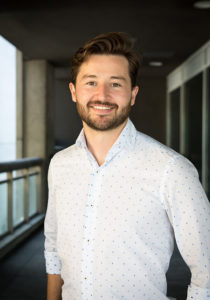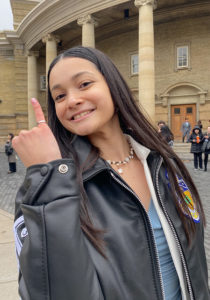With U of T Engineering’s convocation ceremonies on June 18, 2024, our students mark the end of one journey and the beginning of another.
Having enriched the U of T Engineering community as undergraduate and graduate students, they will join our vibrant, global network of Skule™ alumni, where they will continue to address pressing challenges around the world and inspire the next generation.
Among this year’s 14 Engineering Grads to Watch, MIE graduands Peter Serles and Selena Lombardi embody the spirit of U of T Engineering. Their stories illustrate the creativity, innovation and global impact that define our community. Watch their next steps!
Peter Serles (MIE MASc 1T9, MIE PhD 2T4)

Serles’ research in nanomechanics and nanomaterials took on many shapes during his time at U of T.
“The crowning piece of my thesis was using machine learning combined with nanoscale 3D printing to design a material that weighs as much as Styrofoam but has the strength of structural steel,” he says.
The versatile applications of this work brought Serles to South Korea, where he collaborated with the Korean Advanced Institute of Science and Technology. He also held two visiting scientist positions at Rice University in Houston, Texas, and in Lyon, France, working with the French Space Agency.
Serles was the recipient of a Vanier Canada Scholarship and a Connaught PhD for Public Impact Fellowship, and he will receive the Canadian Society for Mechanical Engineering PhD Gold Medal at convocation. He was also recently recognized for his leadership and volunteer service, which included his contributions as the only graduate student representative on the President’s advisory committee for the appointment of Vice-President and Provost of the university.
Still, it was his experiences as a course instructor for an undergraduate mechanical engineering design course that helped cement his ambition for the future.
“It was a really rewarding experience to work with a class of 200 students and see the way certain concepts clicked in their minds as they progressed through the term,” he says. “I would love to continue my career in academia. I love research and love teaching in parallel.”
This summer, Serles, will begin his postdoctoral research at the California Institute of Technology, where he will work under the supervision of Professor Julia Greer. The position is supported by a Schmidt Science Fellowship, for which Peter was one of 32 fellows selected worldwide.
“The Schmidt fellowship lets me be ambitious and high-risk, so I plan to pivot into the biomedical and neuroscience space and use my expertise in nano-scale 3D printing to build scaffolds that stem cells can grow on,” Serles says.
“My goal is to build up my expertise in entirely new areas that I can bring back to Canada when I pursue a professorship.”
“I want to thank my supervisor, Professor Tobin Filleter (MIE), for being a mentor and a friend through six-and-a-half, very challenging years. We’ve gone out to eat new things in South Korea together and we were at a conference when the Raptors won the NBA championship. We’ve had many awesome experiences and it’s been such a great opportunity to get to work with and learn from him.”
Selena Lombardi (IndE 2T3 + PEY)

“My time at U of T has been full of self-discovery,” Lombardi says.
Being a part of the Skule™ community has empowered Lombardi to explore new interests while delving deeper into the topics that drew her to pursue industrial engineering.
As co-director of the brand growth and content team at You’re Next Career Network (YNCN), she supported U of T students on their professional development journey. She also collaborated on the team’s inclusivity and accessibility initiative, dedicated to enhancing professional development opportunities for underrepresented students.
As part of the U of T Varsity Blues dance team, she competed in three dance competitions each year against teams from Canadian universities. She also volunteers at the adaptive dance program at Canada’s National Ballet School.
“Dance was a big part of my life growing up, so being able to continue my artistic passions while studying was very important to me,” she says. “I dance up to seven hours per week rehearsing routines and taking classes.
“It may seem like a lot, but dance always gave me the much-needed break I sometimes needed away from studying.”
During her undergraduate studies, Lombardi worked as a summer research assistant at the Human Factors & Applied Statistics Lab, under the supervision of Professor Birsen Donmez (MIE). Her experience studying the effects of distractions in the surgical environment helped her develop the research and analytical skills required for her PEY Co-op role at the University Health Network’s Healthcare Human Factors.
This fall, Lombardi will begin a master’s of applied science at U of T under the supervision of Professors Enid Montague (MIE) and Joe Cafazzo, at the Dalla Lana School of Public Health. Her project will investigate the implementation of artificial intelligence and digital technologies to mitigate the effects of heart failure in Uganda.
“Throughout my degree, I have realized my passion towards solving global health development problems,” she says. “I now aspire to help develop equitable strategies, programs and policies for underserved communities to achieve their full health potential.”
“There are so many people who have helped shape me into the person that I am today, and I owe a debt of gratitude to them. This includes, but is not limited to: Professors Birsen Donmez, Enid Montague, and Michael Gruninger (all MIE); my friends and classmates who have been by my side since first year; and members of YNCN and the U of T Varsity Blues dance team. Most of all, thank you to my family for believing in me through every rejection, failure, success and trial of my mental health journey. I will do my best to support others to achieve their best potential, just like you have done for me.“
– This story was a part of the article originally published on the University of Toronto’s Faculty of Applied Science and Engineering News Site, by Safa Jinje & Rebecca Cheung.